(最新整理)2016七年级上英语(6)
- 格式:pdf
- 大小:183.57 KB
- 文档页数:16
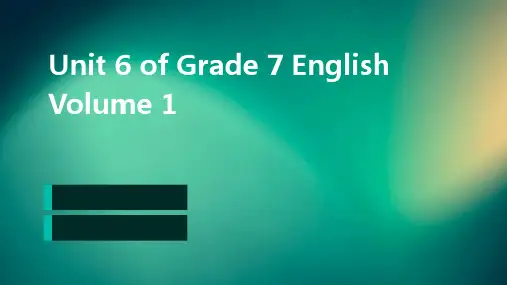
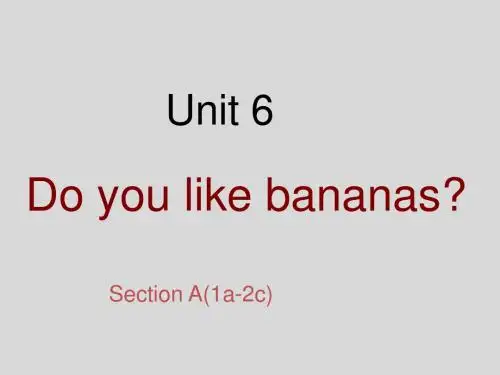
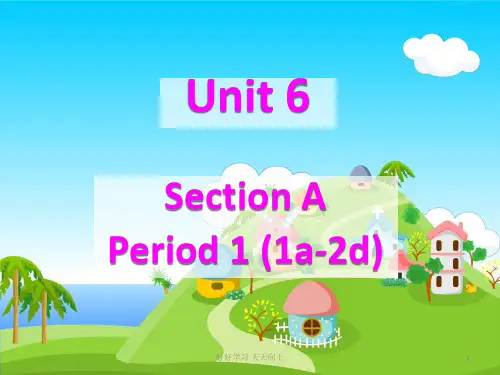
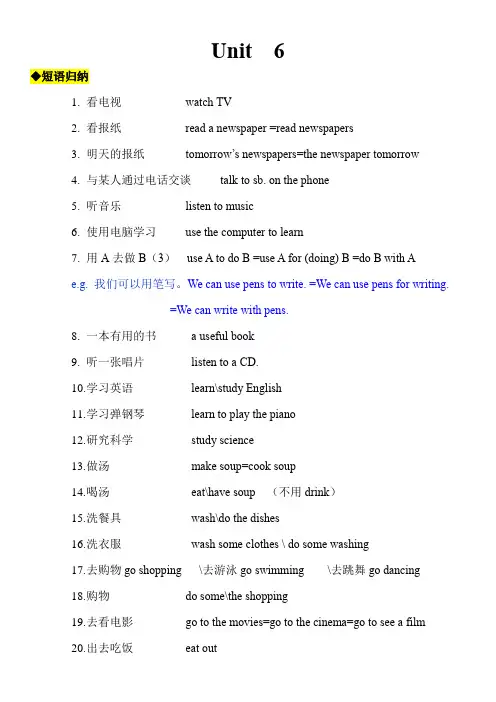
Unit 6◆短语归纳1.看电视watch TV2.看报纸read a newspaper =read newspapers3.明天的报纸tomorrow’s newspapers=the newspaper tomorrow4.与某人通过电话交谈talk to sb. on the phone5.听音乐listen to music6.使用电脑学习use the computer to learn7.用A去做B(3)use A to do B =use A for (doing) B =do B with Ae.g. 我们可以用笔写。
We can use pens to write. =We can use pens for writing.=We can write with pens.8.一本有用的书 a useful book9.听一张唱片listen to a CD.10.学习英语learn\study English11.学习弹钢琴learn to play the piano12.研究科学study science13.做汤make soup=cook soup14.喝汤eat\have soup (不用drink)15.洗餐具wash\do the dishes16.洗衣服wash some clothes \ do some washing17.去购物go shopping \去游泳go swimming \去跳舞go dancing18.购物do some\the shopping19.去看电影go to the movies=go to the cinema=go to see a film20.出去吃饭eat out21.没什么not much =nothing much22.和某人一起做某事join sb. for sth.和我们一起吃晚饭join us for dinner23.沏茶make tea \ 喝茶drink tea24.我很乐意(接受邀请)I’d love to=I’d like to25.我愿意做某事I’d love / like to do sth.26.在游泳池里游泳swim in the swimming pool27.赛车 a car race (race—速度型比赛)28.篮球比赛 a basketball game (game---竞技型、技术型比赛)29.在电视上看龙舟比赛watch the boat races on TV30.与她的祖父母生活\居住在一起live with her grandparents31.包粽子make zongzi32.给她的小孩读故事read a story to her young child33.备考\为考试学习study for the test34.寄宿家庭host family35.端午节the Dragon Boat Festival36.儿童节Children’s Day37.任意一个晚上any other night (any other+可数名词单数)38.任何一个男孩any other boy (any other+可数名词单数)39.想念他的家人miss his family40.错过校车miss the school bus41.错过看那场球赛miss watching that soccer game42.希望做某事wish to do sth. =hope to do sth.43.希望(某人)做某事wish (sb) to do sth (hope×)44.送给你最好的祝福best wishes to you45.打扫客厅clean the living room46.许多男老师many men teachers47.两名男学生two boy students◆句型归纳1.你在做什么?—What are you doing?我在看电视。
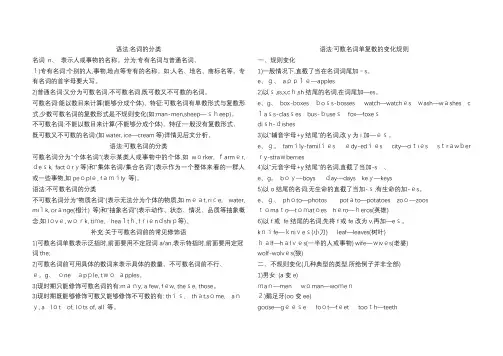
语法:名词的分类名词n、表示人或事物的名称。
分为:专有名词与普通名词、1)专有名词:个别的人,事物,地点等专有的名称。
如:人名、地名、商标名等。
专有名词的首字母要大写。
2)普通名词:又分为可数名词,不可数名词,既可数又不可数的名词。
可数名词:能以数目来计算(能够分成个体)、特征:可数名词有单数形式与复数形式,少数可数名词的复数形式是不规则变化(如:man-men,sheep—sheep)。
不可数名词:不能以数目来计算(不能够分成个体)。
特征:一般没有复数形式、既可数又不可数的名词:(如water, ice—cream等)详情见后文分析、语法:可数名词的分类可数名词分为“个体名词”(表示某类人或事物中的个体,如worker, farmer, desk, factory等)和“集体名词/集合名词”(表示作为一个整体来看的一群人或一些事物,如people, family 等)。
语法:不可数名词的分类不可数名词分为“物质名词”(表示无法分为个体的物质,如meat, rice, water, milk, orange(橙汁) 等)和“抽象名词”(表示动作、状态、情况、品质等抽象概念,如love, work, time, health, friendship等)。
补充:关于可数名词前的常见修饰语1)可数名词单数表示泛指时,前面要用不定冠词a/an,表示特指时,前面要用定冠词the;2)可数名词前可用具体的数词来表示具体的数量、不可数名词前不行、e。
g、one apple, twoapples。
3)现时期只能修饰可数名词的有:many, a few, few, these, those。
3)现时期既能够修饰可数又能够修饰不可数的有: this, that,some, any, a lot of, lots of, all 等。
语法:可数名词单复数的变化规则一、规则变化1)一般情况下,直截了当在名词词尾加-s。
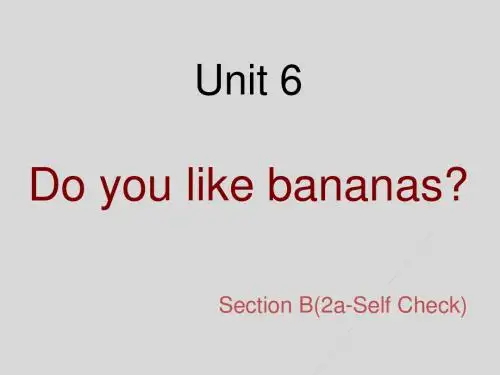
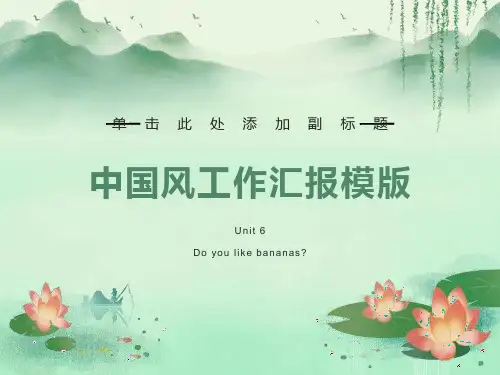
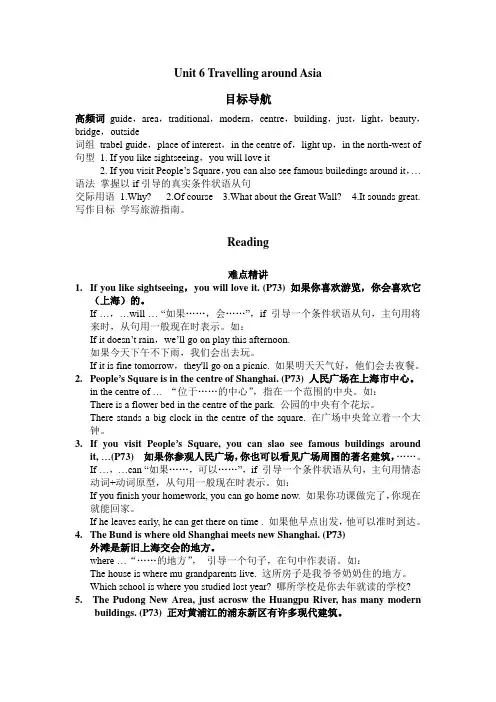
Unit 6 Travelling around Asia目标导航高频词guide,area,traditional,modern,centre,building,just,light,beauty,bridge,outside词组trabel guide,place of interest,in the centre of,light up,in the north-west of 句型1. If you like sightseeing,you will love it2. If you visit People’s Square,you can also see famous builedings around it,…语法掌握以if引导的真实条件状语从句交际用语1.Why? 2.Of course 3.What about the Great Wall? 4.It sounds great. 写作目标学写旅游指南。
Reading难点精讲1.If you like sightseeing,you will love it. (P73) 如果你喜欢游览,你会喜欢它(上海)的。
If …,…will …“如果……,会……”,if 引导一个条件状语从句,主句用将来时,从句用一般现在时表示。
如:If it doesn’t rain,we’ll go on play this afternoon.如果今天下午不下雨,我们会出去玩。
If it is fine tomorrow,they'll go on a picnic. 如果明天天气好,他们会去夜餐。
2.People’s Square is in the centre of Shanghai. (P73) 人民广场在上海市中心。
in the centre of … “位于……的中心”,指在一个范围的中央。
如:There is a flower bed in the centre of the park. 公园的中央有个花坛。
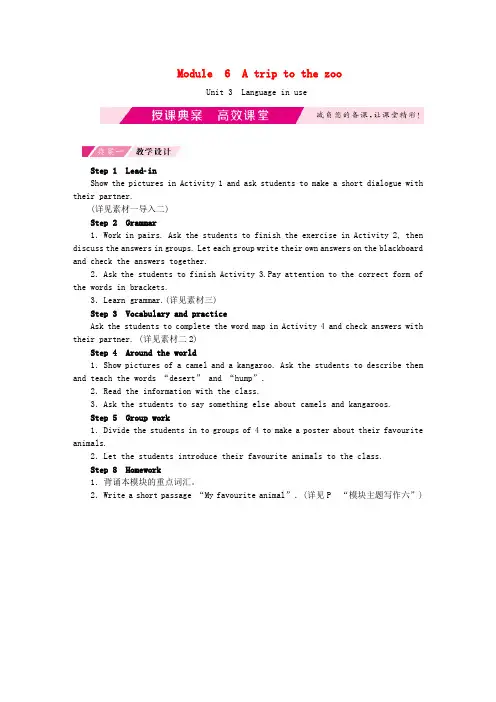
Module 6 A trip to the zooUnit 3 Language in useStep 1LeadinShow the pictures in Activity 1 and ask students to make a short dialogue with their partner.(详见素材一导入二)Step 2Grammar1.Work in pairs. Ask the students to finish the exercise in Activity 2, then discuss the answers in groups. Let each group write their own answers on the blackboard and check the answers together.2.Ask the students to finish Activity 3.Pay attention to the correct form of the words in brackets.3.Learn grammar.(详见素材三)Step 3Vocabulary and practiceAsk the students to complete the word map in Activity 4 and check answers with their partner. (详见素材二2)Step 4Around the world1.Show pictures of a camel and a kangaroo. Ask the students to describe them and teach the words “desert” and “hump”.2.Read the information with the class.3.Ask the students to say something else about camels and kangaroos.Step 5Group work1.Divide the students in to groups of 4 to make a poster about their favourite animals.2.Let the students introduce their favourite animals to the class.Step 8Homework1.背诵本模块的重点词汇。
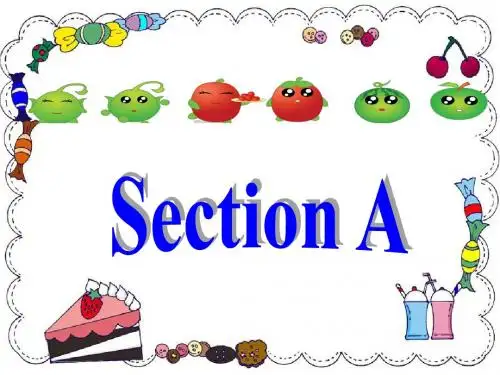
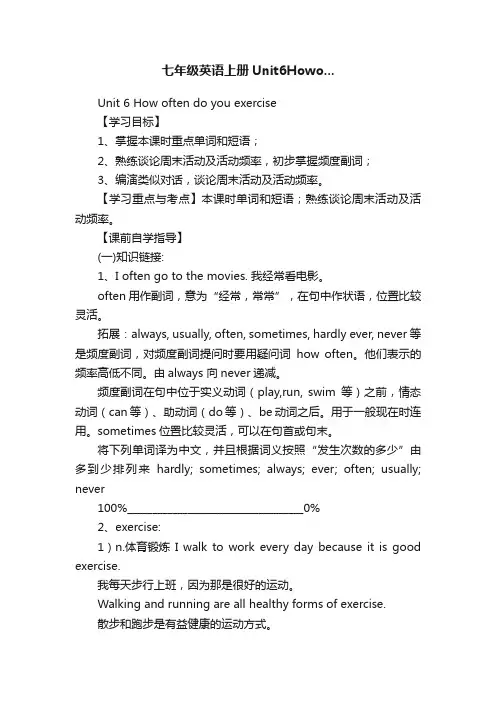
七年级英语上册Unit6Howo...Unit 6 How often do you exercise【学习目标】1、掌握本课时重点单词和短语;2、熟练谈论周末活动及活动频率,初步掌握频度副词;3、编演类似对话,谈论周末活动及活动频率。
【学习重点与考点】本课时单词和短语;熟练谈论周末活动及活动频率。
【课前自学指导】(一)知识链接:1、I often go to the movies. 我经常看电影。
often 用作副词,意为“经常,常常”,在句中作状语,位置比较灵活。
拓展:always, usually, often, sometimes, hardly ever, never等是频度副词,对频度副词提问时要用疑问词how often。
他们表示的频率高低不同。
由always 向never递减。
频度副词在句中位于实义动词(play,run, swim等)之前,情态动词(can等)、助动词(do等)、be动词之后。
用于一般现在时连用。
sometimes位置比较灵活,可以在句首或句末。
将下列单词译为中文,并且根据词义按照“发生次数的多少”由多到少排列来hardly; sometimes; always; ever; often; usually; never100%___________________________________0%2、exercise:1)n.体育锻炼I walk to work every day because it is good exercise.我每天步行上班,因为那是很好的运动。
Walking and running are all healthy forms of exercise.散步和跑步是有益健康的运动方式。
作业,练习We do English exercises to help us learn good English.我们要做英文练习以便学好英语。
2)v. 锻炼,运动 I must exercise more to improve my health.(二)翻译下列短语并在课本上标出。
七上Unit 6 Do you like bananas?重点词组1. French fries 薯条2. ice cream 冰淇淋3. look at 看....4. ask your partner questions 问你搭档问题5. find out 找出6. next to 靠近,紧挨着7. eat well 吃得好8. running star 赛跑明星9. lots of=a lot of10. healthy food 健康食物11. for breakfast/lunch/dinner作为早/午/晚餐12. for dessert 作为甜点13. go on a picnic 去野餐14. a group of friends 一群朋友15. make a list of 列一张....清单重点句型1.---Do you like salad? ---Yes, I do./No, I don’t.2.---Do they like French fries? ---Yes ,they do./No,they don't.3.---Does he like pears? ---Yes,he does./No,he doesn't.4.For breakfast,she likes eggs,bananas and apples.5.For lunch,she likes hamburgers,salad and pears.6.For dinner,she has chicken,tomatoes,French fries and,for dessert,ice cream.知识点解析1. Do you like bananas ? 你喜欢香蕉吗?like的用法1) like v.like sth. / sb. 喜欢…like doing sth. 喜欢做…like to do sth. 喜欢…would like to do sth.想做…would like sb. to do sth.想要某人做…2) like prep. be like 像…look/sound like 看/听起来像…What does your father like? 你父亲喜欢什么?(喜好)What does your father look like?你父亲长得什么样?(外貌)What is your father like? 你父亲怎么样?(外貌、性格)2. Let's have ice cream.让我们吃冰淇淋吧.let sb do sth 让某人做某事The work is too difficult. Let Tom help us. 这工作太难了.让Tom帮助我们吧.3. Running star Sandra Clark eats lots of healthy food. 跑步明星...吃很多健康食物lots of+n.复数=a lot of+n.复数=many+n.复数lots of+不可数n.=a lot of+不可数n.=much+不可数n.There are a lot of flowers/lots of flowers/many flowers in the park. 公园里有许多花There is a lot of milk/lots of milk/much milk in the cup. 杯子里有许多牛奶4. And for dinner, she has chicken, tomatoes, French fries and, for dessert, ice cream.晚餐她吃鸡肉、西红柿和薯条,甜点是冰淇淋(1)句中介词for表示"作为,当作",后面接名词.如:—What do you have for breakfast? 你们早餐吃什么?—We have bread and milk.我们吃面包和牛奶(have sth for breakfast/lunch/supper/dinner早/午/晚餐吃...)(2)have在此句译为"吃"have breakfast/lunch/supper/dinner(3)以o结尾的名词,有生命的加es,常见的有:potatoes(土豆),tomatoes(西红柿).无生命的加s,常见的有:zoos(动物园),photos(照片),kilos(公斤),radios(收音机)(4)and作为并列连词,在此句中连接两个分句,后一分句为使句子简洁省略了前面的she has,即for dessert, she has ice cream重点语法一.一般现在时1. 定义:一般现在时表示经常性、习惯性的动作,或表示现在的特征、状态.当主语是非第三人称单数时,行为动词的一般现在时变化形式(见下表)动词第三人称单数:情况构成例词一般动词加s comes, spells, waits, talks, sees, dances以s,x, sh, ch,结尾加es watches, washes, wishes, finishes以辅音字母加y结尾去y,加ies study/studies, hurry/hurries, try/tries以元音字母加y结尾加s plays, says, stays, enjoys, buys以o结尾加es does, goes特殊情况 are/is, have/has2.句式结构肯定句主语+行为动词原形+其他We speak Chinese.否定句主语+don’t/doesn't+行为动词原形+其他We don’t speak Chinese.一般疑问句Do/Does+主语+行为动词原形+其他?Do you speak Chinese?肯定回答Yes,主语+do/does Yes, we do.否定回答No,主语+don’t/doesn't No, we don’t.He has classes from Monday to Friday. 他从周一到周五上课—Does he often write to his friends? 他经常给他的朋友们写信吗?—Yes, he does. /No, he doesn't. 是的,他经常写/不,他不经常写3.时间状语:often,always,usually,every day,every week ....二.名词1.名词的数:名词分为可数名词和不可数名词.不可数名词没有复数形式,可数名词有单、复数之分情况构成例词一般情况加s fathers, books, Americans, Germans, apples, bananasx,sh,ch,s结尾加es boxes, glasses, dresses, watches, wishes, faxes辅音字母加y 去y,加iesbaby-babies, family-families, duty-duties, comedy-comedies,documentary-documentaries, story-stories元音字母加y 加s day-days, boy-boys, toy-toys, key-keys, ways以o 结尾加s(es)除Negroes, heroes, tomatoes, potatoes, mangoes 外其余都加”-s” 如photos, zoos (口诀:黑人和英雄喜欢吃西红柿、土豆和芒果)以f 或fe 结尾 去f/fe 加ves wife-wives, knife-knives, wolf-wolves, thief-thieves, shelf-shelves, self-selves,life-lives, half-halves, leaf-leaves,(口诀:妻子持刀去宰狼,小偷吓得发了慌;躲在架后保己命,半片树叶遮目光) 单复数相同不变1、单复数相同:fish, sheep, deer, Chinese, Japanese2、只有复数:people, pants, shorts, shoes, glasses, gloves, clothes, socks3、集体名词是单数也是复数:police 警察局/警察, class 班/同学, family 家/家庭成员 合成的复数1、一般只加主要名词,多为后一个单词action movie/action movies,pen pal/pen pals2、如果是由man 或woman 所组成的合成词的复数则同时为复数 man doctor/men doctors, woman teacher/women teachers单复数意思不同fish 鱼 fishes 鱼的种类;paper 纸 papers 报纸/卷子/论文;glass 玻璃 glasses 玻璃杯/眼镜;orange 橘汁oranges 橙子;time 时间 times 时代/次数;chicken 鸡肉 chickens 小鸡 特殊形式child-children, man-men, woman-women, foot-feet,tooth-teeth, mouse-mice, policeman-policemen, Englishman-Englishmen2. 可数名词与不可数名词(1)英语中的名词可分为可数名词与不可数名词.凡是可以计数的名词叫可数名词.物质名词和抽象名词一般无法用数目来衡量,称为不可数名词.可数名词有复数形式,可与不定冠词a 或an 数词连用;不可数名词没有复数形式,它不能与不定冠词或连用来表示量,如:food,meat,bread,tea,water,milk,ink,orange(橘汁),drink(饮料),rice,fish 等①常用的可数名词如下:a.人、动物或植物等 如:friend,cat,roseb.有形状的具体事物 如:ball,car,bookc.度量单位 如:hour,kilo,meterd.不可数名词的各个部分 如:part,piecee.一些抽象名词如idea②常用的不可数名词包括以下名词a.固体的物质或原料 如:bread,riceb.液体、气体等 如:water,tea,airc.语言 如:English,Chinesed.一些抽象事物 如:money,peace(2)有许多名词在汉语中是可数名词,在英语中却是不可数名词.如:chalk 粉笔;bread 面包;paper 纸(3)不可数名词表示"一个"概念时,要用短语如:a cup of tea a glass of milk a bottle of orange a piece of bread (4)many,much 只可以分别修饰可数与不可数名词How many 主要用于对可数名词的数量提问,how much 主要用于对不可数名词的数量提问 How many bottles of orange do you want? 你想要多少瓶橘子汁? How much tea do you want? 你想要多少茶?(5)a lot of, lots of, some, any 即可以修饰可数名词,也可以修饰不可数名词a lot of, lots of, much, some, any 修饰不可数名词,后面的名词不变 a lot of, lots of, many, some, any 修饰可数名词,后面的名词是复数巩固练习一.单项选择( )1. ________ you like ice cream?A. AreB. AmC. DoesD. Do( )2. I have a soccer ball. _____ play soccer.A. LetB. DoC. Let’sD. Does( )3. ——________ does your father have ______ lunch? ——Chicken and tomatoes.A. What; forB. What; /C. How; forD. How; /( )4. He has _____ egg and _____ hamburger.A.an, anB.a,aC.an, aD.a, an( )5. What ______ Tom like _______ for breakfast?A. does; eatB. is; eatC. does; to eatD. is; to eat( )6. Do you like ice cream for ______ dessert?A. aB. theC. /D. an( )7.——Does your friend like salad? ——_________.A. Yes, she like.B. No, she does.C. Yes, she doesn’tD. No, she doesn’t. ( )8. I have a cat. It likes fish. It eats _______ every day.A. a lotB. manyC. Lots ofD. much( )9. We need lots of ___ every day.A.healthy foodB.saladsksD.vegetable( )10. ——Do they like hamburgers? ——Yes, they like ________ very much.A.itB.themC.theirD.Its( )11.Aunt Li likes ____ bananas.A.eatB.eatingC.eatsD.eatting( )12. Mary French fries.A. don’t likeB. doesn’t likeC. doesn’t likesD. like( )13. Make a list vegetables to buy.A. ofB. forC. atD. on( )14. I don’t have at home.A. the lunchB. a lunchC. lunchD. lunches( )15. Many boys like to play .A. soccerB. a soccerC. the soccerD. soccers( )16. Thanks your photos. They are very nice.A. ofB. onC. atD. for( )17. Your watch is very nice. _______.A. No,it isn't .B.Yes.C. Thank you .D. Sorry( )18. He doesn't play sports, he only ______them ______TV.A. watches, onB. looks, onC. looks at, inD. watches, in ( )19. On Sunday, he ____________ a good rest at home and ___________his homework.A. has; doesB. has; doC. have; doesD. does; does ( )20. __________ the picture! What can you ___________?A. Look; seeB. Look at; seeC. See; lookD. See; look at二.英汉互译1.吃晚饭_____________2.lots of_____________3.healthy food_____________4.French fries_________________________ 5 .一个鸡蛋______________________ 6.一些花椰菜_________________________ 7.七个草莓8.赛跑明星___________________________ 9.四个西红柿10.一些鸡肉___________________________三.根据句意和首字母完成单词1.I have hamburgers for b___________.2. Here are some tomatoes. Do you like t _________?3. I like French f _________.4. I have an ice c_________.5. Children should (应当) eat lots of v___________.6. What do you have for d__________?7. Zhou Jielun is a singing s________.8. She eats h________ food every day.9. How m________ apples do you have?10. I’m going on a picnic with a group of f_________.四.用所给词的正确形式填空1.–Do you like bananas?--No, I don’t like __________ (it) at all.2.Peter likes ________ (play) basketball.3.His mother ________ (not) like French fries.4.I like strawberry ice cream, but I d on’t like ________. (strawberry)5.They like _________ (eat) hamburgers and carrots for lunch.五.按要求改写句子1.Linda and Tom like French fries.(改成否定句)They _____ ______ French fries.2.Does Tom like eggs for breakfast?(否定回答)______, ______ _______.3.She doesn’t have lunch.(变肯定句)She _______ lunch.4.My teacher plays basketball.(改一般疑问句)______ your teacher ________ basketball?5.We play volleyball.(变成由Let开头的祈使句)______ _______ volleyball.六.完形填空Mrs Jones: Which meal do we need most, breakfast, lunch or ___1___?Tony: Dinner.Mrs Jones: Dinner is the big meal of the day. But I don’t ___2___ we need it most.Tony: Is lunch the meal we want most?Mrs Jones: No, ____3___ is the meal we need most. But why?Kate: It is a long time from night to morning. We have no ____4___.Mr s Jones: Right! If we don’t have breakfast, we don’t feel ____5____. But what makes a good breakfast? James: I think we can ____6____ milk, bread, noodles or porridge. ___7____ are good for breakfast.Mrs Jones: That’s right. We can eat some vegetables and fruits ___8____ the morning, too. They make us healthy. David: I ____9___ coca cola a lot. Can I have that in the morning?Mrs Jones: You’d better not. Water is good for you.Danny: Mum says we can not eat too much things after ____10____.Mrs Jones: Great, Danny. It may make you sick. After sports you need water and a rest first, not lots of food.( ) 1. A. fruits B. food C. dinner( ) 2. A. like B. know C. think( ) 3. A. breakfast B. lunch C. dinner( ) 4. A. water B. food C. vegetables( ) 5. A. good B. great C. well( ) 6. A. take B. make C. have( ) 7. A. You B. They C. We( ) 8. A. for B. in C. on( ) 9. A. eat B. bring C. like( ) 10. A. school B. lunch C. sports七.翻译下列句子1.咱们晚饭吃西红柿和鸡蛋吧_____________________________________________________________.2.那位赛跑明星经常吃很多健康食品__________________________________________________________ _.3.我吃沙拉作为甜点_______________________________________________________________.4.我姐姐不喜欢花椰菜_______________________________________________________________.5.Tom午饭喜欢吃汉堡包八.阅读理解ATom: Good evening, Mum.Mum: Good evening, Tom.Tom: Do we eat chicken for dinner, Mum?Mum: No, we eat fish and carrots, dear.Tom: Mum, I don’t like carrots. I li ke chicken.Mum: But we need more vegetables, not only meat. It’s not healthy to eat chicken every day.Tom: OK. But dad likes chicken, too.Mum: Well, let’s eat chicken and broccoli tomorrow. (明天)Tom: That sounds great!( ) 1. What do they eat for dinner?A. chickenB. CarrotsC. Carrots and fish( ) 2. what does Tom want to eat for dinner?A. fishB. chickenC. broccoli( ) 3. What do they need to eat more?A. chickenB. meatC. vegetables( ) 4. Does Tom’s father like chicken?A. No, he doesn’tB. Yes, he does.C. We don’t know.( ) 5. what will they eat tomorrow?A. fish and carrotsB. chicken and fishC. broccoli and chickenBIt is six forty in the morning. The children are coming into the classroom. A girl is opening the windows. Some are laughing and talking. Some are listening to them. Some are reading books. Some are doing their homework.Miss Lin is standing behind the teacher’s desk. She is writing on the blackboard. Sue and Anna are wearing their new dresses today. Ann is cleaning her desk. Mike is helping her. They all look happy.What are Bill and Bob doing? Oh, dear! They are still playing basketball.( ) 1. The children are _________.A. in the schoolB.at homeC.in a boatD.on the hill.( ) 2. What are the children NOT doing?A. Doing their homeworkB. Writing on the blackboardC. Laughing or talkingD. Reading books.( ) 3. The teacher is _________.A. Miss GaoB. Miss LinC. SueD. Four( ) 4. How many students are not in the classroom?______A. OneB. TwoC. ThreeD. Four( ) 5.Which is Not right? _______A. Ann is cleaning the blackboard.B. Mike is helping Ann clean her desk.C. Bill and Bob are still playing basketball.D. The students all look happy.CThere is a park near my home. People like to go to this park after work. Some of them go to the park every day. Look! This is Mr. King. He is sitting on a chair and watching the children. Some children are playing a game. Some boys are playing football. Lucy and Lily are standing under a big tree. They are talking about their favorite movies. There is a small river in the park. We can see some boats on the water. Some children are sitting in the boats with their parents. Listen! A girl is singing. It’s really a nice park. I come here every day.( ) 1. ____like to go to the park.A.ChildrenB. ParentsC. Lucy and LilyD. People( ) 2.There are some ____ in the park.A.birds and catsB.chairs and boatsB.C. balls and kites D. houses and buses( ) 3. Lucy is talking with____.A.Mr. KingB. the boysC.LilyD.her parents( ) 4. We can’t see ____ in the park.A.childrenB. menC. womenD. bird( ) 5. What is the writer doing?A. He’s watching the people in the park.B. He’s playing a gameC.He’s sitting in a boatD. He’s singing under the tree九.任务型阅读根据材料,请找出Jim Green为家人准备的晚餐,并填写表格Today is my birthday. I want to thank my family for their love. So I cook the dinner for them. I know my mother likes hamburgers and broccoli. But my father likes chicken and tomato soup. I have a brother. He likes hamburgers, too. But he doesn’t like broccoli. He likes carrots. I have a sister, too. She likes fish and French fries.I like chicken and strawberries. I will buy these things for the birthday party.Mrs Green Mr Green brother sister JimHamburger and(1)________ (2)__________________(3)__________________(4)__________________(5)__________________十.书面表达写一篇5-8句的短文,介绍你的家人以及他们的饮食习惯(包括他们喜欢或不喜欢吃的食物、饮料、水果等)参考答案一、1—5 DCACC 6—10 CBDAA 11—15 BBACA 16—20 DCAAB二、1.have/eat dinner 2. 许多 3. 健康食品 4. 薯条 5. an egg6.some broccoli7. seven strawberries8.running star9. four tomatoes 10.some chicken三、1—5 breakfast, tomatoes, fries, cream, vegetables6—10 dinner, star, healthy, many, friends四、them, to play, doesn’t, strawberries, to eat五、don’t like No, he doesn’t strawberries has Does, play Let’s play六、CCABC CBBCC七、1.Let's have tomatoes and chicken for dinner.2.The running star often eats lots of healthy food.3.I have salad for dinner.4.My sister doesn't like broccoli5.Tom likes to have hamburgers for lunch.八、A篇: CBCBC B篇: ABBBA C篇: DBCDA九、broccoli chicken, potato soup hamburgers, carrots fish, French frieschicken, strawberries十、(略)。
U6 Section A John’’s birthday dinner is next week. 1. 约翰的生日晚会在下周. Johns think about the food. 2. 让我们想想食物. Le Let’t’t’s think about the food. 3. 听起来不错听起来不错 Sounds good. 4. 我认为约翰喜欢吃草莓和苹果. I think John likes strawberries and apples. 变否定句: I don’t think John likes strawberries and apples 变否定句:变一般疑问句:Do you think John likes strawberries and apples? Let’’s have strawberries and apples. 5. 让我们吃草莓和苹果吧。
Let6. 我喜欢踢足球,但是我现在不想踢足球我喜欢踢足球,但是我现在不想踢足球I like playing soccer , but now I don’t like to play soccer。
---Let’’s get salad 8. ---让我们买沙拉让我们买沙拉. ---Let---行。
行。
---OK /Sure/Sounds good 9. 在照片里有一个桌子和一个棒球。
在照片里有一个桌子和一个棒球。
There is a table and a baseball in the picture。
图片里有什么? What is in the picture ? 图片里有什么?在房子里有两个球. There are two balls in the room. 对划线部分提问: What is in the room ? 对划线部分提问:10. 对。
有益。
有益 be good for 擅长、在某方面做得好 be good at 擅长、在某方面做得好擅长学英语 be good at learning English 擅长学英语对我们健康有益 be good for our health 对我们健康有益11. 不同种类的。